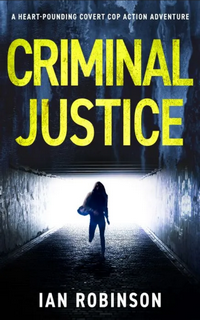 I was very excited this week to see that the good people over at The Good Folks have republished Ian Robinson’s dynamite debut, with a new title and with out a nom de plume. You can go read what I said about Criminal Justice‘s first incarnation back in 2018, here. I wanted to do something to celebrate this release and hopefully draw some eyes to Robinson’s work, so we hastily set up this Q&A. It’s a little different than my usual M.O. (it’s been years since I read the book for one thing, so I couldn’t ask a lot of specifics). I like the results, hopefully you do, too.
I was very excited this week to see that the good people over at The Good Folks have republished Ian Robinson’s dynamite debut, with a new title and with out a nom de plume. You can go read what I said about Criminal Justice‘s first incarnation back in 2018, here. I wanted to do something to celebrate this release and hopefully draw some eyes to Robinson’s work, so we hastily set up this Q&A. It’s a little different than my usual M.O. (it’s been years since I read the book for one thing, so I couldn’t ask a lot of specifics). I like the results, hopefully you do, too.
But first…what is Criminal Justice? (you should check out the publisher’s site for details on getting a copy)
The first book in a totally gripping hard-boiled crime fiction series
Undercover detective Sam Batford is through with police budget cuts and ineffectual superiors. But has he gone rogue?
He is sent to work with a serious crime team in London to take down a big drugs boss. Their chief, DCI Klara Winter, doesn’t appreciate Batford’s presence. The feeling is entirely reciprocal.
Batford has his eyes on the money, except when they are drawn to Stoner, an attractive blonde who is pivotal to the organised crime syndicate’s operations.
Now embroiled in the gang, as Batford plays one side against the other, the risk of his cover being blown increases. This comes to a head when he is faced with the option of confession or torture.
Who will have the last laugh in this high-octane battle of wits?
CRIMINAL JUSTICE is the first book in this riveting series of pulp crime thrillers by Ian Robinson. The second book, STATUS DRIFT, is coming soon.
So, this is not your first time doing a Q&A here, but it’s the first time as Ian Robinson. What brought on the name change? I assume since most of your books are out now (with at least one more on the way) using this name that it’s going to stick?
A pleasure to be invited back on your blog. That’s a reasonable question, and the answer is yes, Ian Robinson is the name I’ll be writing under. I used Ian Patrick (my first and middle name) originally, as I’d just left the police due to ill health. I had a crippling fear of failure, rejection, and self-doubt. I left school at 16 with nothing and figured my books would bomb. Seven books later and, I guess, I proved myself to be wrong.We’re supposed to be talking about Criminal Justice, so let’s focus on that for a bit. The publisher’s blurb is above–but let’s hear it from you—give the reader an elevator pitch for this book, and while we’re it, the Batford series.
I’m terrible at elevator pitches! If you enjoyed the TV series Line of Duty, then these books will appeal. If you like fast-paced thrillers, you won’t be disappointed. I inject some realities of policing within the fiction which gives the narrative a feel of authenticity you won’t get from other books in this genre.What was behind the decision to re-brand this series now? You’ve said that the editing was updated, too—what kinds of (I’m assuming relatively minor) changes have been made to this?
I wanted to reach a new audience and I’ve been impressed with the way The Book Folks operate. They’ve helped me reach new readers with the Nash and Moretti series and getting my stories out there is what it’s about for me. I want people to be entertained. I want the reader to feel that time spent with my work has been of value. The story is the same as the original, but it’s been valuable for me to work with editors to ensure we got the maximum out of the novel in terms of structure and plot. Things have changed since it was first published, particularly with police departments and place names. The editing team were superb in picking these details up.After all this time—and seven published books—what was it like coming back to Criminal Justice? Was it good to be reacquainted, or did you spend a lot of time second-guessing choices you made back then?
Great question. I didn’t second guess anything. I know how good these books are and will stand by them to the grave. I did realise that my mind wasn’t in a great place when I originally wrote the books, but that added to the creativity.You won’t read another crime thriller series like this one. How can I claim that? I used my own policing experience to convey the adrenaline rush on the page. I’ve been in many confrontations, fights, and chases and I can express how this feels from reality. I didn’t read crime fiction either. The realities of the job were enough. This gave me the advantage of putting my own voice on paper. I feel this comes across in a fresh and exciting way and why the BBC optioned the originals for a six-part TV series. The producers could see this too. Sadly, it never progressed beyond the script outline as the pandemic hit the industry and decisions were taken to go in other directions as a result.
I will always be proud of these books, and I wish to acknowledge Chris McVeigh at Fahrenheit Press for supporting me with the originals. Times change, and I have too. I’m embarking on a new chapter in my writing and it feels wonderful to have Batford back with a new brand and to see where it takes him.
The last time we talked about Sam Batford, you mentioned that “writing about a corrupt man goes against all my core values.” Particularly in light of the new look that society is taking at policing in general, and police corruption in particular—is it harder to bring Batford back? Were you tempted to soften him up a bit (last time you said you tried, but it didn’t work) now?
Corruption is, and always will be, an issue for society and isn’t solely within the police. With any public body you’ll have issues of corruption. The beauty of creating a character like Batford is that you can write from a place that disturbs you and that’s where the writing takes on a life of its own. This is where the creative energy takes you to places you thought you’d never want to explore. It can be liberating in terms of story. My Nash and Moretti series is based on investigating murder so this limits how you can approach the writing in some way (to me anyway). With Batford, he is a cop with very few boundaries. He will cross the line, but he does have his own moral code he wouldn’t breach. I can explore the official side through Winter and her team and Batford’s world where anything could happen. Not being constrained in this way is liberating when it comes to the story.According to your publisher, the second book, Status Drift, is coming soon, can you share the new title of the third book yet? More importantly (for me, anyway), does this rebranding open the door for further Batford books? Maybe a prequel?
There’s no confirmed title for book 3 and never say never for more from this character.That’s not the definitive “yes” that I was hoping for, but it’s good enough. 🙂
What is next for Ian Robinson, author, in that case?
To remain grounded and not get hung up on the future. I’m waiting to see what the response is to Criminal Justice then I can decide on a direction to take. I’m hoping Batford will be positively received. I love this character and the scope to expand his world is exciting to me.Thanks for your time, sir! It’s always a pleasure.
Readers—there’s no better time to introduce yourself to Ian Robinson and/or Sam Batford than right now. You won’t soon forget either of them.




1 Pingback